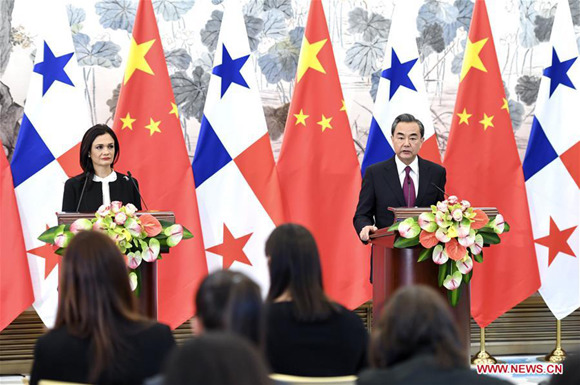
Chinese Foreign Minister Wang Yi and Isabel Saint Malo de Alvarado, Panama's vice president and foreign minister, attend a press conference after their meeting in Beijing, capital of China, June 13, 2017. China and Panama signed a joint communique Tuesday on the establishment of diplomatic relations. (Xinhua/Zhang Ling)
Panama signed a joint communique with China in Beijing Tuesday to establish diplomatic relations and break so-called "diplomatic ties" with Taiwan, a move perceived as more extensive recognition of the one-China principle and a warning to the Taiwan administration.
After signing the communique, Chinese Foreign Minister Wang Yi told reporters that the political decision made by the Panamanian government meets the fundamental interests of the country, and accords with the development trend of the times as well as the one-China framework already in place in the international community.
Also on Tuesday, Ma Xiaoguang, spokesperson for the State Council's Taiwan Affairs Office, said the move accords with the will of the people and represents an irresistible trend, urging the Taiwan administration to clearly understand the situation and make the right choice.
Jiang Shixue, director of the Latin America research center at Shanghai University, said it is natural for China, the second largest user of the Panama Canal, to attract countries that previously have not had diplomatic relations, especially with its years of development and strengthened national power.
"The establishment of diplomatic relations between the two countries will promote cooperation between China and Central America and the Caribbean region, and will have a demonstrative effect," he said.
Tuesday's news has triggered a strong rebound in public opinion in Taiwan.
Many in Taiwan regarded Panama's choice of severing "diplomatic relations" with the island a serious defeat for the current Democratic Progressive Party (DPP) administration, saying the DPP has only itself to blame.
Hung Meng-kai, deputy director-general of the KMT Culture and Communications Committee, said the breaking of "ties" meant the DPP administration's "foreign policy" had completely failed, and would only lead Taiwan to isolationism.
"The DPP's so-called maintaining the status quo policy in cross-Strait relationship has also been a complete failure. Two countries have broken 'ties' with Taiwan within a year, is this the outcome our administrators, who claimed themselves as the best communicators, have given us?" said Hung, who warned that more countries might follow suit.
Panama is the second country to break ties with Taiwan since the DPP administration took office in May last year. It was Taiwan's most important "friend" in Central and South America and was the first nation Taiwan's current leader Tsai Ing-wen visited after she took power.
According to Hsieh Ming-hui, chief executive officer of the Taiwan Competitiveness Forum, the DPP administration's refusal to recognize the 1992 Consensus had damaged the political mutual trust between Taiwan and the Chinese mainland, and hence resulted in the reduction of international space for Taiwan.
"The DPP should be fully responsible," Hsieh added.
Ties between China and Panama go back more than 160 years.
The first group of Chinese immigrants arrived in Panama in the mid-1850s to work on the construction of the trans-isthmus railway, which served as the main international cargo route until the Panama Canal was built.
The establishment of diplomatic relations did not come as a surprise for Wu Hongying, director of the Latin America office of the China Institute of Contemporary International Relations.
"Both the politicians and business people in Panama have witnessed China's increasing influence and regard it as an active and responsible power," Wu said.
Yuan Zheng of the Chinese Academy of Social Sciences said the one-China principle, which was acknowledged in the Resolution 2758 adopted by the UN General Assembly in October 1971, has become a universal consensus in the international community.
"More and more countries that have so-called 'diplomatic relations' with Taiwan will establish diplomatic ties with China in the future," Yuan said.


















































